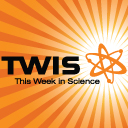Podcast: Play in new window | Download (Duration: 1:13:03 — 33.9MB)
Mining For Genes, Not By The Porpoise’s Chin, Chicken From Hell, Dogs Dig Odors, Python GPS, Old Faithful Owl Monkeys, Sharing Is Caring For Parrots, Sleep For Your Brain, Killing Pain With Cone Snails, Interview w/ BICEP2 co-leader Dr. Chao-lin Kuo, And Much More
Disclaimer disclaimer disclaimer
This Week in Science
Coming Up Next…
Mining For Genetic Expression
It’s not just what genes you’ve got, but how they are expressed that matters. At Berkeley Lab, researchers created the largest analysis to date of the transcriptome (the RNA that tells DNA to make something) using fruit flies, which are used as a model organism for human disease because they are similar in many genetic respects. They found new genes and rare RNAs involved in many tissues, unexpected complexity within the nervous system and brain, and surprising new aspects to the stress response.
Porpoise Gots Chin
An extinct California porpoise had an elongated chin, called a symphysis, measuring 83-84 cm longer than its closest living relative, the Crown porpoise. Researchers used CT scanning to discover it had significant internal nerve tracts that would have made the chin very sensitive, and allowed it to transmit all sorts of information to the porpoise as it probed the sea floor for food.
The Chicken From Hell
North America was once home to a giant demon chicken.
Your dog
digs your odor
Pythons have a GPS
What are they, pigeons?!
Owl monkeys are faithful
No cheating for these primates!
Parrots share
If they know it will benefit them in the long run…
Get a free audiobook at Audible.com!
Support us on Patreon!
GUEST INTERVIEW: Dr. Chao-lin Kuo from Stanford University and the BICEP2 experiment in Antarctica that recently detected evidence of the Big Bang.
Stanford SLAC press release
http://www.theguardian.com/science/2014/mar/17/bicep2-how-hot-big-bang-science-dark-energy
https://www.simonsfoundation.org/quanta/20140317-possible-echo-of-big-bang-detected/
Chao-lin telling Andrei Linde about discovery (Video)
More Science!!!
Sleep loss causes permanent damage
Up to 25% of neurons died in the locus coerulus of mice on sleep schedule similar to that of people on shift-work. Making up for lost sleep by sleeping more did not repair the damage.
If You love TWIS, please consider making a donation below. Don’t forget to tell a friend about TWIS, and to check out our Patreon page!


